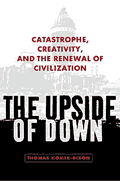| |
BOOK REVIEW OF ...
The Upside of Down
Catastrophe, Creativity, and the Renewal of Civilization
by Thomas Homer-Dixon
Peak oil is upon us, we have ever-worsening environmental degradation, and we face a deepening global financial crisis. We at GP also feel frustration at the seeming impossibility of solving our problems within the iron envelope of today's reigning free-market plutocracy. Thus it should be no surprise that we were pleased to see a book explained how to reframe this
 troubled situation and strategize to take advantage of any coming chaos. The book's title is The Upside of Down—Catastrophe, Creativity, and the Renewal of Civilization, by Thomas Homer-Dixon.
troubled situation and strategize to take advantage of any coming chaos. The book's title is The Upside of Down—Catastrophe, Creativity, and the Renewal of Civilization, by Thomas Homer-Dixon.
Like many other books that use Peak Oil as a central plank in their platform, The Upside of Down offers a deep analysis of what ails society, with special attention paid to the role energy plays in our modern society. What sets it apart, however, is how broad and deep Homer-Dixon's view of energy is: he considers energy from modern sources like oil and coal, of course, but he also reaches back into history to show that even grain harvests were an energy source for civilizations of centuries and millennia ago.
Like now, energy played a large role in how pre-industrial societies thrived and, eventually, failed. The author offers an interesting analysis of the Roman Empire's acquisition, management, and use of energy, and how overextension of territory and complexity relative to the amount of energy available to support and control the empire was a key feature of Rome's decline. The parallel and forewarning for the American empire is very clear.
Also explored in The Upside of Down are the concepts of complexity, connectivity, and resilience in systems—as systems become larger, more complex, and more interconnected, they necessarily become less and less resilient, leaving them highly exposed to disruptions, breakdowns, and collapse. The fossil-fuel bonanza of the 20th century allowed our modern world to expand and "complexify" beyond the wildest dreams of our forefathers, but so too did it increase the danger of catastrophic breakdown—by orders of magnitude.
In the heightened danger of failure, however, Homer-Dixon sees the best potential for successful reform. Despite decades of effort by many good-willed and right-minded people to correct societal injustices, economic trickery, and environmental abuse, we have continued descending into the Chasm of Worser and Worser. That is because all progress has occurred within the general bounds of the status quo. The Powers That Be have a very tight grip on things, and they are disinclined to change the current system, doomed though it may be, in a way that sacrifices their short- and medium-term elitist advantages for the greater long-term common good.
But all is not lost. During a period of substantial breakdown, the utter dissatisfaction of the masses and their sudden return to civic attentiveness may be the right moment—the only possible moment—to propose and implement policies radical enough to break the plutocrats' stranglehold on the planet.
We at Grinning Planet give Homer-Dixon's theory our stamp of approval. However, we would have been happier if The Upside of Down had featured less material on Down and more on Upside. Out of 12 chapters, only the last two have any deep discussion of how the phoenix of a fair society might rise from the ashes of a collapsed money-mad bizarro world. While the analyses of how civilizations expand and contract (or fail outright) were insightful and essential to understanding the need for breakdown as a trigger for positive change, we were eager to hear more about the practicalities of how we might help steer the foundering ship when the waters are finally troubled enough to try. (Perhaps that will be in his next book!)
Still, all in all, The Upside of Down does a good job of laying the foundation for breakdown/rebirth thinking and is a good place to start for anyone who senses serious trouble ahead (which should be everyone at this point), recognizes the difficulty of wresting control from the current corrupt cabal, and wants to begin understanding how the coming "breach moment" may be our last best hope for a sustainable, equitable, peaceful long-term future.
Check out The Upside of Down at
Amazon.com
Or see more books on GP:
We also have cartoons and articles . . .
|
|
|
|
|
Hey, we don't pick
the Google ads! – GP
|
| |
| CLICKS ON OUR ADS AND PURCHASES VIA OUR AMAZON LINKS HELP SUPPORT THIS FREE SITE... THANKS! |
|
|
|
|

